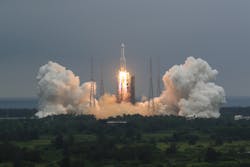Falling parts of Chinese rocket highlight dangers uncontrolled re-entries of space debris
WASHINGTON – After a huge Chinese rocket plummeted apparently into the ocean late Saturday 8 May, NASA's administrator condemned the country's use of launch technology that makes uncontrolled re-entries from orbit. Space.com reports. Continue reading original article
The Military & Aerospace Electronics take:
14 May 2021 -- NASA Administrator Bill Nelson released a statement after the U.S. Space Command's 18th Space Control Squadron confirmed the Chinese Long March 5B core stage re-entered the atmosphere at 10:14 p.m. eastern time and fell into the Indian Ocean north of the Maldives.
"Spacefaring nations must minimize the risks to people and property on Earth of re-entries of space objects and maximize transparency regarding those operations," Nelson said. "It is clear that China is failing to meet responsible standards regarding their space debris."
Space debris expert Jonathan McDowell, an astrophysicist at the Harvard-Smithsonian Center for Astrophysics in Cambridge, Mass., says the sheer size of China's rocket made this a larger piece of uncontrolled debris for Earth to deal with in several decades.
Related: NASA takes delivery of Orion spacecraft crew module by Lockheed Martin
Related: The electronics design challenges of hypersonic flight
John Keller, chief editor
Military & Aerospace Electronics
